November 6, 2017 •
Four Federal By-Elections to be Held December 11
On November 5, Elections Canada announced several by-elections for the House of Commons will be held on December 11. The federal by-elections will be held for the electoral districts of Battlefords–Lloydminster (Saskatchewan), Bonavista–Burin–Trinity (Newfoundland and Labrador), Scarborough–Agincourt (Ontario), and South […]
 On November 5, Elections Canada announced several by-elections for the House of Commons will be held on December 11. The federal by-elections will be held for the electoral districts of Battlefords–Lloydminster (Saskatchewan), Bonavista–Burin–Trinity (Newfoundland and Labrador), Scarborough–Agincourt (Ontario), and South Surrey–White Rock (British Columbia) to fill vacancies in the House of Commons.
On November 5, Elections Canada announced several by-elections for the House of Commons will be held on December 11. The federal by-elections will be held for the electoral districts of Battlefords–Lloydminster (Saskatchewan), Bonavista–Burin–Trinity (Newfoundland and Labrador), Scarborough–Agincourt (Ontario), and South Surrey–White Rock (British Columbia) to fill vacancies in the House of Commons.
Battlefords–Lloydminster (Saskatchewan) MP Gerry Ritz resigned on August 31 in order to retire from politics.
Bonavista–Burin–Trinity (Newfoundland and Labrador) MP Judy Foote resigned Bonavista-Burin-Trinity in September. Foote has been on leave since April for personal family medical reasons. In August, she had resigned her position as Minister of Public Services and Procurement.
The seat for Scarborough–Agincourt (Ontario) became vacant on September 14 when MP Arnold Chan died at the age of 50 of cancer after a three-year battle.
South Surrey–White Rock (British Columbia) MP Dianne Watts resigned to run for the provincial Liberal leadership.
July 31, 2017 •
Ontario MPP Murray Resigns; No Byelection to be Called
Today, MPP Glen R. Murray of the Legislative Assembly of Ontario announced his resignation from the Legislative Assembly and as Minister of the Environment and Climate Change effective September 1, 2017. Murray is leaving to work as the executive director […]
 Today, MPP Glen R. Murray of the Legislative Assembly of Ontario announced his resignation from the Legislative Assembly and as Minister of the Environment and Climate Change effective September 1, 2017. Murray is leaving to work as the executive director at the Pembina Institute, an environmental think-tank.
Today, MPP Glen R. Murray of the Legislative Assembly of Ontario announced his resignation from the Legislative Assembly and as Minister of the Environment and Climate Change effective September 1, 2017. Murray is leaving to work as the executive director at the Pembina Institute, an environmental think-tank.
Premier Kathleen Wynne announce she will not call a byelection to replace MPP Glen Murray in order to save the province the cost of administrating the election, according to CBC News. Murray’s legislative seat will remain vacant until the next general election set for June 7, 2018. Wynne announced MPP Chris Ballard will replace Murray as minister, according to the premier’s press release.
June 5, 2017 •
Several Legislatures Adjourn in Canada
Several Canadian legislative sessions adjourned last week: On June 2, the Legislative Assembly of the Northwest Territories adjourned. Legislation considered this session included infrastructure and operations expenditure bills as well as an amendment to the Tobacco Tax Act. The Legislative Assembly […]
 Several Canadian legislative sessions adjourned last week:
Several Canadian legislative sessions adjourned last week:
- On June 2, the Legislative Assembly of the Northwest Territories adjourned. Legislation considered this session included infrastructure and operations expenditure bills as well as an amendment to the Tobacco Tax Act. The Legislative Assembly is scheduled to reconvene on September 19, 2017, and to adjourn on October 4, 2017. The Legislative Assembly is scheduled to then again reconvene on October 17, 2017, and to adjourn on October 20, 2017.
- On June 1, the first session of the 41st Legislature of the Quebec National adjourned until June 6. One piece of legislation still being considered is Bill 56, the Lobbying Transparency Act, introduced in 2015. The bill would expand the scope of the definition of lobbyists to include shareholders lobbying for an entity as well as directors and officers of a nonprofit. The bill would also expand the types of activity considered to be lobbying and impose stricter penalties and higher fines on violators of the law. The National Assembly is scheduled to reconvene on June 6, 2017, and to adjourn on June 16, 2017.
- On June 1, the Legislative Assembly of Ontario adjourned on June 1, 2017. In the last week of the session, Bill 138, Transparency in Government Bills Act, 2017, was introduced. The bill would require all proposed legislation to include a statement describing the problem the bill seeks to address, a description of the public policy goals the bill seeks to achieve, and a summary of the financial costs the bill would have on the government, municipalities, the public, and any affected industries or businesses. The Legislative Assembly is scheduled to reconvene on September 11, 2017, and then adjourn on December 14, 2017.
- On June 1, the Newfoundland and Labrador House of Assembly adjourned to the call of the Chair. During this latest session, amendments to the Intergovernmental Affairs Act and the House of Assembly Accountability, Integrity and Administration Act were considered. The next scheduled sitting day is Monday, November 6, 2017. The Assembly is then scheduled to adjourn on December 7.
On March 1, a new lobbying law took effect in the Regional Municipality of Peel, Ontario. By-law Number 47-2016 creates a Lobby Registry and Registration System and establishes the position and duties of the Lobbyist Registrar. The new law covers […]
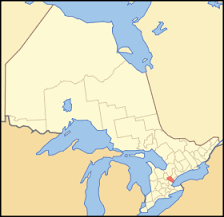 On March 1, a new lobbying law took effect in the Regional Municipality of Peel, Ontario. By-law Number 47-2016 creates a Lobby Registry and Registration System and establishes the position and duties of the Lobbyist Registrar.
On March 1, a new lobbying law took effect in the Regional Municipality of Peel, Ontario. By-law Number 47-2016 creates a Lobby Registry and Registration System and establishes the position and duties of the Lobbyist Registrar.
The new law covers consultant, in-house, and voluntary unpaid lobbyists. A return is required to be filed within five business days of a covered communication or may take place in advance of lobbying. Lobbyists must register a separate subject matter registration for each issue they lobby and must include a description of the issue being lobbied, who will be lobbied, and when the lobbying will occur or has occurred.
Former public office holders are prohibited from lobbying for one year after leaving their position. Lobbying on a contingency basis is also prohibited under the new law.
February 24, 2017 •
Canada: Five By-Elections on April 3 Called for House of Commons
On April 3, five by-elections will be held for the Canadian House of Commons. On February 22, Prime Minister Justin Trudeau announced four by-elections for the electoral districts of Saint-Laurent, Quebec, Calgary Heritage and Calgary Midnapore, Alberta, and Markham—Thornhill, Ontario. […]
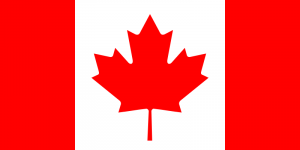 On April 3, five by-elections will be held for the Canadian House of Commons. On February 22, Prime Minister Justin Trudeau announced four by-elections for the electoral districts of Saint-Laurent, Quebec, Calgary Heritage and Calgary Midnapore, Alberta, and Markham—Thornhill, Ontario. Trudeau had previously announced on February 19 a by-election would be held for the electoral district of Ottawa—Vanier, Ontario.
On April 3, five by-elections will be held for the Canadian House of Commons. On February 22, Prime Minister Justin Trudeau announced four by-elections for the electoral districts of Saint-Laurent, Quebec, Calgary Heritage and Calgary Midnapore, Alberta, and Markham—Thornhill, Ontario. Trudeau had previously announced on February 19 a by-election would be held for the electoral district of Ottawa—Vanier, Ontario.
The vacancies requiring the by-elections came about for different reasons. Last year, former prime minister Stephen Harper and member of Parliament(MP) Jason Kenney resigned from their House of Commons seat representing electoral districts Calgary Heritage and Calgary Midnapore, respectively.
The seats for electoral districts Saint-Laurent and Markham-Thornhill were left vacant last month after ministers Stephane Dion and John McCallum were named to diplomatic posts, according to the Globe and Mail. The seat representing electoral district Ottawa-Vanier became vacant when MP Mauril Belanger died last year from amyotrophic lateral sclerosis.
January 3, 2017 •
Effective January 1, Corporations Prohibited from Making Political Contributions in Ontario, Canada
On January 1, the Election Finances Statute Law Amendment Act took effect, prohibiting political contributions from corporations and labor unions and lowering the province’s contribution limits from individuals. The new law also prohibits all provincial politicians, candidates, and senior political […]
 On January 1, the Election Finances Statute Law Amendment Act took effect, prohibiting political contributions from corporations and labor unions and lowering the province’s contribution limits from individuals.
On January 1, the Election Finances Statute Law Amendment Act took effect, prohibiting political contributions from corporations and labor unions and lowering the province’s contribution limits from individuals.
The new law also prohibits all provincial politicians, candidates, and senior political staffers from attending fundraising events, with certain exceptions.
Third-parties, who currently face no spending restrictions on advertising, are now limited to $100,000 per election period and $600,000 in the six months before a general election is called.
October 28, 2016 •
Amendments Offered to Ontario Campaign Finance Bill
On October 26, new amendments were offered to a contentious bill moving through the Legislative Assembly of Ontario banning corporate political contributions. Bill 2, Election Finances Statute Law Amendment Act, 2016, was introduced in the Legislative Assembly of Ontario in […]
 On October 26, new amendments were offered to a contentious bill moving through the Legislative Assembly of Ontario banning corporate political contributions.
On October 26, new amendments were offered to a contentious bill moving through the Legislative Assembly of Ontario banning corporate political contributions.
Bill 2, Election Finances Statute Law Amendment Act, 2016, was introduced in the Legislative Assembly of Ontario in September to amend the current campaign finance laws. The bill prohibits corporations, unions, and unincorporated groups not affiliated with political parties from making political contributions to parties, candidates, constituency associations, and nomination and leadership contestants.
According the National Post, new amendments introduced by Ontario’s Liberal government would prohibit any members of the provincial parliament, party leaders, nomination contestants, candidates, and leadership contestants from attending fundraisers, with certain exceptions. Opponents of the bill say those exceptions provide loopholes.
Other changes in the bill are disclosure requirements for political parties concerning fundraisers.
If passed, the law would come into force on January 1, 2017.
October 7, 2016 •
Ontario Bill Banning Corporate Contributions Moves Forward
On October 4, Ontario’s campaign finance bill banning corporate contributions was referred to a standing committee. Bill 2, Election Finances Statute Law Amendment Act, 2016, was introduced in the Legislative Assembly of Ontario in September to amend the current campaign […]
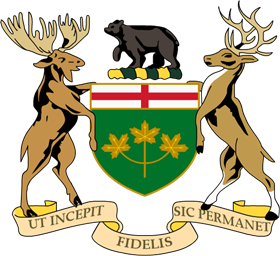 On October 4, Ontario’s campaign finance bill banning corporate contributions was referred to a standing committee. Bill 2, Election Finances Statute Law Amendment Act, 2016, was introduced in the Legislative Assembly of Ontario in September to amend the current campaign finance laws.
On October 4, Ontario’s campaign finance bill banning corporate contributions was referred to a standing committee. Bill 2, Election Finances Statute Law Amendment Act, 2016, was introduced in the Legislative Assembly of Ontario in September to amend the current campaign finance laws.
The bill prohibits corporations, unions, and unincorporated groups not affiliated with political parties from making political contributions to parties, candidates, constituency associations, and nomination and leadership contestants.
Individuals, who may now make political contributions in the amount of up to $33,250, would be limited to maximum contributions of $3,600. Specifically, an individual could give $1,200 to a party each year, $1,200 to the candidates of a party in an election period, and $1,200 to the constituency associations and nomination contestants of a party each year. Additionally, individuals would be limited to giving a maximum of $1,200 to each leadership contestant of a party per calendar year. Among the other changes in the bill are disclosure requirements for political parties concerning fundraisers.
If passed, the law would come into force on January 1, 2017.
August 23, 2016 •
Ontario Legislative Assembly Continues Consideration of Campaign Finance Legislation
On August 22, Government House Leader Yasir Naqvi released proposed amendments to a campaign finance reform bill the Ontario Legislative Assembly has been considering this session. The Election Finances Statute Law Amendment Act, 2016, Bill 201, was introduced on May […]
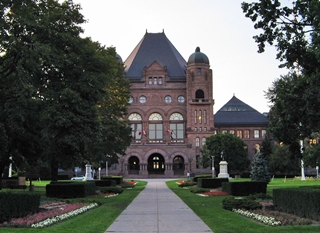 On August 22, Government House Leader Yasir Naqvi released proposed amendments to a campaign finance reform bill the Ontario Legislative Assembly has been considering this session. The Election Finances Statute Law Amendment Act, 2016, Bill 201, was introduced on May 17.
On August 22, Government House Leader Yasir Naqvi released proposed amendments to a campaign finance reform bill the Ontario Legislative Assembly has been considering this session. The Election Finances Statute Law Amendment Act, 2016, Bill 201, was introduced on May 17.
Changes in the newly proposed amendments include lower contribution limits. However, the amendments do not address the “cash-for-access system” that allows those making large political contribution to have personal and interactive contact, such as dinners, with public officials, according to The Globe and Mail. The bill has been considered since June by the Standing Committee on General Government. This and other amendments are expected to be debated in the coming weeks.
Photo of the Ontario Legislature by on Wikimedia Commons.
July 1, 2016 •
Ontario, Canada’s Lobbying Law Amendments Take Effect Today
Today Ontario’s Office of the Integrity Commissioner will begin enforcing a new lobbying law for the province. On December 9, 2014, the Legislative Assembly had passed an omnibus bill with changes to the province’s Lobbyists Registration Act, 1998. The law […]
 Today Ontario’s Office of the Integrity Commissioner will begin enforcing a new lobbying law for the province.
Today Ontario’s Office of the Integrity Commissioner will begin enforcing a new lobbying law for the province.
On December 9, 2014, the Legislative Assembly had passed an omnibus bill with changes to the province’s Lobbyists Registration Act, 1998. The law came into force by proclamation of the lieutenant governor. Schedule 8 of Bill 8, the Public Sector and MPP Accountability and Transparency Act, 2014, gives the Ontario Integrity Commissioner as Lobbyist Registrar new investigative and enforcement power for violations. Individuals found in violation can be prohibited from lobbying for up to two years.
Additional changes include a streamlined registration form for certain companies, a lower threshold registration for in-house lobbyists, and new questions on registration forms.
May 23, 2016 •
Ontario, Canada Lobbying Law Changes Coming in July
Effective July 1, Ontario’s Office of the Integrity Commissioner will begin enforcing a new lobbying law for the province. On December 9, 2014, the Legislative Assembly had passed an omnibus bill with changes to the province’s Lobbyists Registration Act, 1998. […]
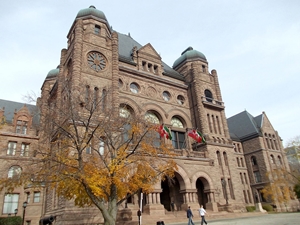 Effective July 1, Ontario’s Office of the Integrity Commissioner will begin enforcing a new lobbying law for the province. On December 9, 2014, the Legislative Assembly had passed an omnibus bill with changes to the province’s Lobbyists Registration Act, 1998. The law is now coming into force by proclamation of the Lieutenant Governor.
Effective July 1, Ontario’s Office of the Integrity Commissioner will begin enforcing a new lobbying law for the province. On December 9, 2014, the Legislative Assembly had passed an omnibus bill with changes to the province’s Lobbyists Registration Act, 1998. The law is now coming into force by proclamation of the Lieutenant Governor.
Schedule 8 of Bill 8, the Public Sector and MPP Accountability and Transparency Act, 2014, gives the Ontario Integrity Commissioner as Lobbyist Registrar new investigative and enforcement power for violations. Individuals found in violation can be prohibited from lobbying for up to two years. Additional changes include a streamlined registration form for certain companies, a lower threshold registration for in-house lobbyists, and new questions on registration forms.
May 18, 2016 •
Campaign Finance Bill to Ban Corporate Contributions Introduced in Ontario Canada Legislative Assembly
On May 17, a bill to amend the Election Finances Act was introduced in the Legislative Assembly of Ontario. Bill 201, the Election Finances Statute Law Amendment Act, 2016, which also includes amendments to the Taxation Act, 2007, bans corporate […]
 On May 17, a bill to amend the Election Finances Act was introduced in the Legislative Assembly of Ontario.
On May 17, a bill to amend the Election Finances Act was introduced in the Legislative Assembly of Ontario.
Bill 201, the Election Finances Statute Law Amendment Act, 2016, which also includes amendments to the Taxation Act, 2007, bans corporate and union donations to political parties. The legislation will also limit contributions from individuals, limit spending for third-party advertising, and tighten political party spending and fundraising rules for by-elections.
If passed, the changes are hoped to be in place or significantly underway before the June 2018 election, with initial changes legislated for January 1, 2017.
April 26, 2016 •
Canadian Senator Cleared of Bribery and Fraud Charges
Sen. Mike Duffy was cleared of 31 charges of bribery, fraud, and breach of trust on April 21, 2016. The charges stem from Duffy using Senate funds to pay for travel, housing in Ottawa, and other activities loosely tied to […]
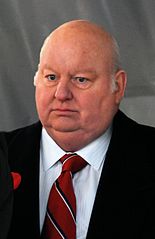 Sen. Mike Duffy was cleared of 31 charges of bribery, fraud, and breach of trust on April 21, 2016. The charges stem from Duffy using Senate funds to pay for travel, housing in Ottawa, and other activities loosely tied to his work as a senator. He was also charged with soliciting a bribe from then-Prime Minster Stephen Harper’s chief of staff, Nigel Wright, in order to repay expenses ruled improper.
Sen. Mike Duffy was cleared of 31 charges of bribery, fraud, and breach of trust on April 21, 2016. The charges stem from Duffy using Senate funds to pay for travel, housing in Ottawa, and other activities loosely tied to his work as a senator. He was also charged with soliciting a bribe from then-Prime Minster Stephen Harper’s chief of staff, Nigel Wright, in order to repay expenses ruled improper.
Following a 62-day trial, Ontario Court Justice Charles Vaillancourt dismissed 27 counts and found Duffy not guilty on the last four charges. In the 308-page decision, Vaillancourt found Duffy followed the rules of the Senate to the best of his ability, as the rules regarding legitimate expenses are vague.
Vaillancourt’s ruling also singled out Wright and other staff members in the Prime Minister’s Office for their behavior when dealing with the situation. Evidence, including emails, showed staff threatening, cajoling, and ultimately forcing Duffy to accept the money from Wright.
Had he been convicted, Duffy would have faced fines and jail time.
Photo of Sen. Mike Duffy by Ayelie on Wikimedia Commons.
April 13, 2016 •
Ontario Premier Announces Campaign Finance Legislation
Ontario, Canada Premier Kathleen Wynne announced provincial legislation will be introduced in May banning corporate and union donations to political parties. The legislation will also limit contributions from individuals, limit spending for third-party advertising, and tighten political party spending and […]
 Ontario, Canada Premier Kathleen Wynne announced provincial legislation will be introduced in May banning corporate and union donations to political parties. The legislation will also limit contributions from individuals, limit spending for third-party advertising, and tighten political party spending and fundraising rules for by-elections.
Ontario, Canada Premier Kathleen Wynne announced provincial legislation will be introduced in May banning corporate and union donations to political parties. The legislation will also limit contributions from individuals, limit spending for third-party advertising, and tighten political party spending and fundraising rules for by-elections.
“I believe it is important that these changes be in place or significantly underway before the June 2018 election, with initial changes legislated for Jan. 1, 2017,” iPolitics.ca reported Wynne as saying.
State and Federal Communications, Inc. provides research and consulting services for government relations professionals on lobbying laws, procurement lobbying laws, political contribution laws in the United States and Canada. Learn more by visiting stateandfed.com.

